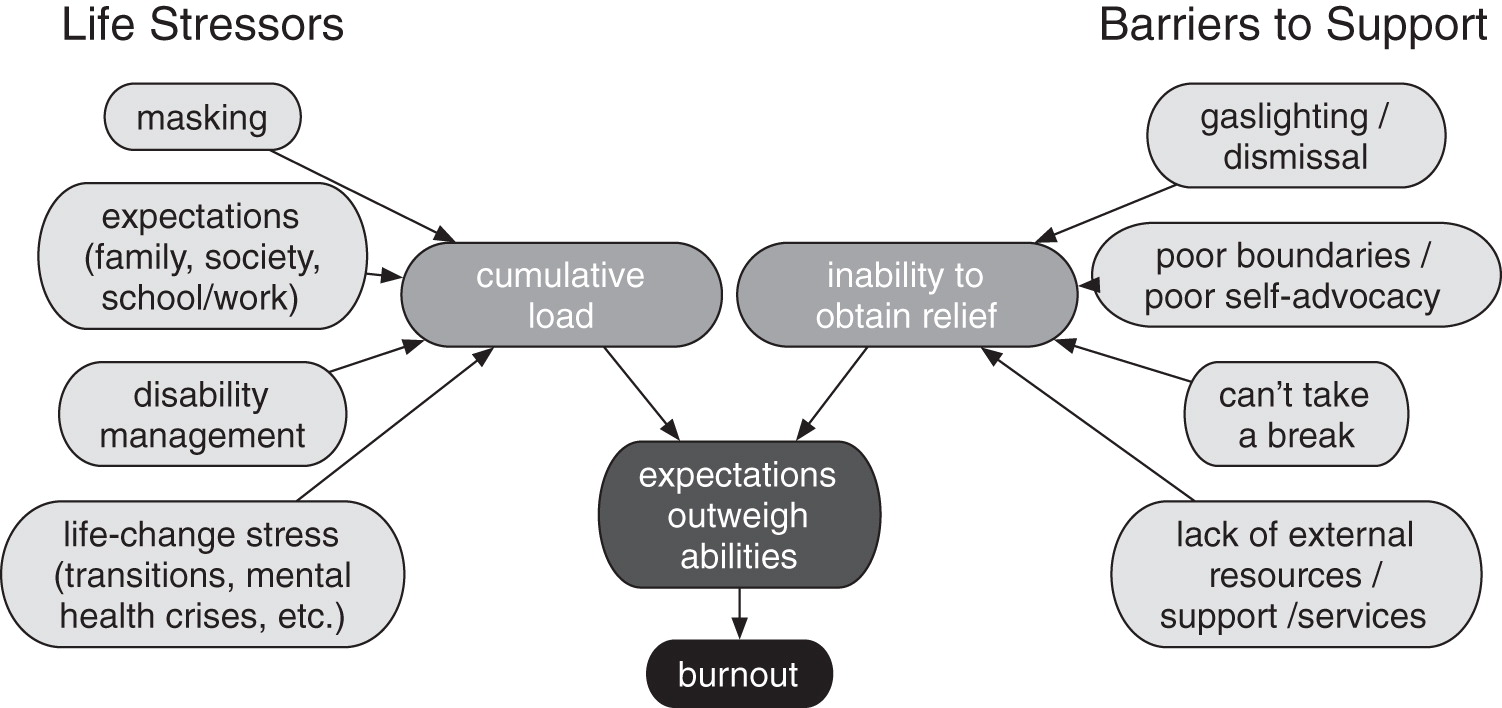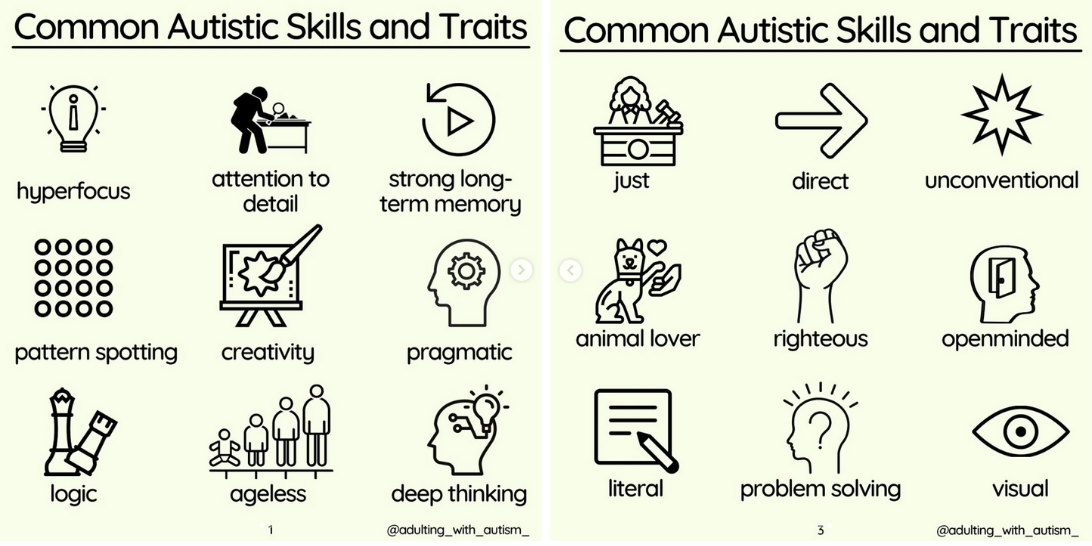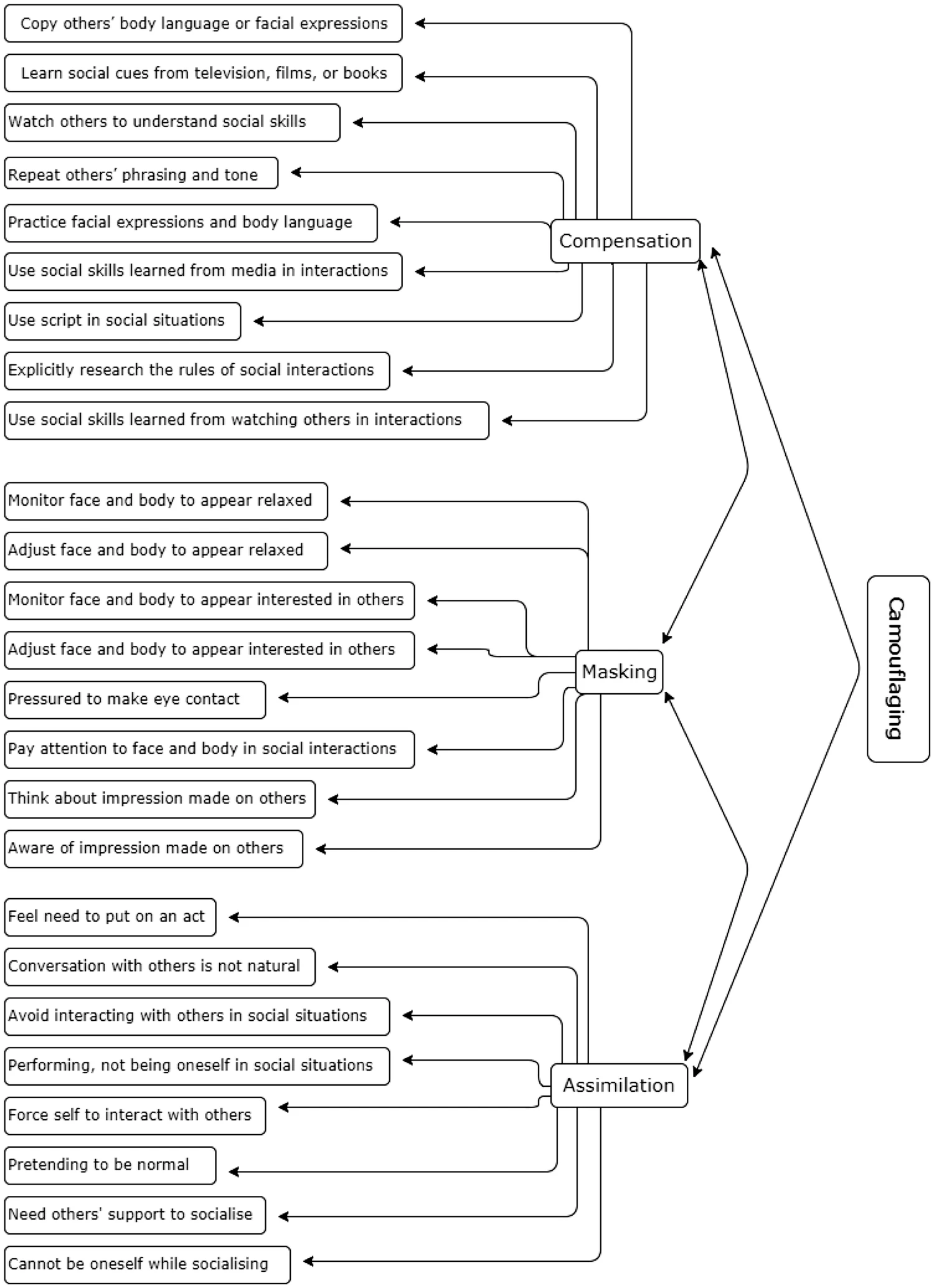The Journey
My best friend often says I'm "on a journey."
I know what he means by that, but for some reason the word journey sounds weird to me every time he says it.
Now I see he's been right all along, and as it turns out, my journey is not all that unique. It's quite similar to that of other late-identified autistic adults who grew up before awareness of the autism spectrum was more common as it is today.
(In fact, when I was a kid in the late 80's and early 90's, the concept of the "spectrum" didn't even exists as it does now. As of 2013, autism spectrum disorder combines a variety of related conditions previously known as autistic disorder, childhood disintegrative disorder, asperger syndrome, pervasive developmental disorder not otherwise specified, and rett's disorder.)
I prefer identity-first langaguage over "person with autism" or "on the spectrum." The term spectrum is a little misleading and implies there is a low end and a high end. Thinking of it in terms of high and low functionling labels doesn't convey how it's a much more complex mix of unique challenges and strengths that present differently in different autistic people, the same way non-autistic people's strengths and weaknesses vary from on person to the next.
 Credit: @Autism_sketches
Credit: @Autism_sketches
We still have a long way to go to raising awareness and acceptance of autism as well as other types of neurodiversity, but I'll save those thoughts for another time.
Here's a glimpse into how my journey to being diagosed with ASD came to be, and some of what I've learned about autism along the way.
Autistic Burnout
Imagine not being able to manage daily life the way you always had. The problem is far more complex than it sounds, because there isn't one specific thing keeping you so off balance. You're constantly exhausted and lethargic, feel a loss of motivation even for activies that are normally joyful and regenerative, and can experience a loss of skills from executive functioning to socializing, emotional regulation, and more.
In the simplest of anologies, it's like your internal batteries aren't able to hold their charge anymore.
This is called autistic burnout (sometimes referred to as autistic regression), and it is very difficult to recover from. Recovery doesn't happen overnight and is not linear. Even when you're "resting" it's hard to catch your breath. The more you ignore or are even unaware of what you're experiencing, the worse it gets.
Although there is currently very little scientific literature about autistic burnout, it is one of the most heavily discussed topics within adult autistic communities. Searching for "autistic burnout" on PubMed only returns 27 results at the time of writing, and if you look closer, there are more papers highlighting burnout experienced by parents, teachers, and caregivers to autistic children than the experiences of autistic people themselves. I'm hopeful this will change over the next several years as awareness continues to grow and access to diagnosis increases.
I did find one recent and aptly titled paper with lots of good information gathered through interviews with autistic adults of all ages: "Having All of Your Internal Resources Exhausted Beyond Measure and Being Left with No Clean-Up Crew": Defining Autistic Burnout.
Although the authors state their study is just a first step towards a better understanding of what autistic burnout is as well as a need for input from a more diverse sample of autistic adults across different backgrounds, they summarize their findings in a conceptual model that I personally find highly relatable to my own experience.
 Credit: Dora M. Raymaker, Alan R. Teo, Nicole A. Steckler, Brandy Lentz, Mirah Scharer, Austin Delos Santos, Steven K. Kapp, Morrigan Hunter, Andee Joyce, and Christina Nicolaidis. Autism in Adulthood. Jun 2020. 132-143.
Credit: Dora M. Raymaker, Alan R. Teo, Nicole A. Steckler, Brandy Lentz, Mirah Scharer, Austin Delos Santos, Steven K. Kapp, Morrigan Hunter, Andee Joyce, and Christina Nicolaidis. Autism in Adulthood. Jun 2020. 132-143.
Experiencing autistic burnout can be very confusing when you've gone all your life without knowing you're autistic. I've always felt different and struggled to relate to others, but my intelligence allowed me to mask my autistic traits and mostly "pass" as neurotypical.
It's easy to fall into a trap of thinking you're being lazy or something must be wrong with you when in fact, your needs aren't being met and the expectations placed on you (both external and internal) outweigh your capacity to meet them.
In my opinion, one of the best parts about being autistic is the tendency to develop deep "special interests". I am lucky enough to have been able to turn my lifelong special interest in computers into a career. In some ways that makes working feel a lot less like work, and instead more like doing what I'd want to be doing anyway, both for fun and fulfillment of my needs.
My support needs overlap a lot with work. I need to keep meetings to a minimum. I need autonomy over my schedule in order to manage my energy levels. I need constant, challenging technical tasks to work on, and lot of quiet time that enables me to hyperfocus. In return, work becomes an extension of my special interest, which is what fuels me and allows me to manage other areas of my life.
That's the opposite of what it seems most people want. I don't get burned out because I can't keep up with challenging work, I get burned out when what often feel like unnecessary meetings pop up (especially on short notice), email and Slack notifications are going off left and right, and clear expectations are not delivered in writing.
Where many enjoy social distractions throughout the day and prefer close collaboration (and occasionally I do, too), those things can totally throw the rest of my day off. I don't desire to be anti-social, but the constant interruptions to my flow state are detrimental to my mental health and wellbeing. I've learned the hard way that over time, not prioritizing my needs eventually leads to what I now recognize is autistic burnout.
In my experience, when burnout hits, it's a sign you're feeling overwhelmed by not having the support you require to not be "disabled". For me, the problems often start with work and then bleed over into other areas of my life.
To be clear, autism does not come and go: you either have it or you don't. But with ASD Level 1, you lack the intellectual disability that can come with higher levels of support needs, and therefore your differences can be less obvious. You do still require support, such as workplace accommodations and safe spaces to unmask. Not getting the kind of support needed can actively disable you to a point you are no longer able to fully manage your life because you are struggling to get by on a daily basis. In the worst cases, it can lead to prolonged unemployment, poor mental and physical health, and even suicide.
(This is just one, very import reason that more awareness is needed. It is entirely possible to be an independent, seemingly "high functioning" adult, yet feeling stuck in a state where your energy is depleted from just trying to get by.)
A Different Neurotype
Autism is not a mental illness, it is a different neurotype. Although what exactly separates an autistic brain from a non-autistic one is still actively being researched, it is thought that the pathways that information travels through an autistic brain are "wired" differently to the extent that autistic people process information and experience the world unlike most non-autistic people.
It's sometimes referred to as a different "operating system" for this reason, as if comparing iOS vs. Android. In other words, it is simply one of several types of neurodiversity, similar to how there are many kinds of biodiversity.
It is diagnosed by the presence of "deficits" in a variety of areas including social-emotional reciprocity, nonverbal communication, building and maintaining relationships, as well as restricted, repetitive patterns of behaviors or interests, and sensory processing differences. (Although I and many in the autistic community would argue the medical definition only scratches the surface, and unfortunately doesn't describe any of the unique strengths and talents that can coexist with the challenges.)
What this means is "simple" things like socializing and spontaneity that are naturally easy for most people can be difficult and exhausting for autistic people, including myself. How "normal" those things are can easily be taken for granted by neurotypical people, while undiagnosed autistic people can struggle to understand what is wrong with them that those seemingly basic activities can be so draining.
The flip side of that is that other things like having deep special interests, the ability to hyperfocus on something for a long period of time, strong attention to detail, thinking in systems and/or pictures, and spotting patterns that others cannot see can be easy for autistic people while challenging for others.
 Credit: @adulting_with_autism_
Credit: @adulting_with_autism_
Part C
In the DSM-5, the latest edition of the diagnostic manual written by the American Psychiatric Association, criterion "C" for an ASD diagnosis states "Symptoms must be present in the early developmental period (but may not become fully manifest until social demands exceed limited capacities or may be masked by learned strategies in later life)."
I'm not a medical expert, but I think there is a lot to unpack in this requirement so I will break it down into 3 parts:
- Symptoms must be present in the early developmental period
- [Symptoms] May not become fully manifest until social demands exceed limited capacities
- [Symptoms] May be masked by learned strategies in later life
Usually the emphasis here is placed on part 1, that in order to receive a diagnosis, there needs to be evidence of symptoms in early childhood, with parts 2 and 3 being kind of overlooked. Some healthcare providers will not diagnose or even consider autism in adults simply because of this requirement. It can be a major barrier, unfortunately, although I do understand this helps differentiate ASD from other potential diagnoses, which is an essential part of the process when assessing adults.
I think parts 2 and 3 are really interesting though, and they hint at the experience I and many other late-identified adults have had. If you recall the conceptual model of autistic burnout from above, some of the contributing factors are masking and social demands from family, friends, society, and work that when added up exceed limited capacities, exactly as described in the DSM.
As an autistic person without an intellectual disability, camouflaging becomes a social crutch to get by on. It helps you blend in by developing compensatory strategies, masking your true feelings, and assimilating in attempt to appear "normal". Such strategies require significant mental overhead that society does not account for. Eventually, the weight of all that overhead becomes too much to carry, and that's when burnout hits.
 Credit: Hull, L., Mandy, W., Lai, MC. et al. Development and Validation of the Camouflaging Autistic Traits Questionnaire (CAT-Q). J Autism Dev Disord 49, 819–833 (2019).
Credit: Hull, L., Mandy, W., Lai, MC. et al. Development and Validation of the Camouflaging Autistic Traits Questionnaire (CAT-Q). J Autism Dev Disord 49, 819–833 (2019).
The figure above comes from a paper describing the development of the Camouflaging Autistic Traits Questionnaire (CAT-Q), a self-report psychometric test designed to measure social camouflaging behaviors in adults. The higher one scores, the less autistic they appear, and scores above 100 indicate significant camouflaging behaviors. I scored 128, which is above average for autistic males and likely helps explain why I was not diagnosed until age 34.
Why Diagnosis Is Vital
Too many adults have struggled to get a diagnosis that can be life affirming and necessary to unlock access to supports they need because too many people, including some healthcare providers, still see autism as a condition that only exists in childhood.
Fact: autistic kids, identified or not, do grow up to become autistic adults.
It's important to keep in mind that none of the strengths or weaknesses I've mentioned here are exclusive to any one neurotype, but it is the particular combination of "deficits" that separates autistic people from allistic people.
I consider it a privilege to possess many of the commmon autistic strengths, but for the past 5-6 years, I've increasingly felt the need to focus my energy towards using them to fight my way out of and away from burnout rather than something more productive and fulfilling. Ultimately it has lead to my diagnosis and improved self-understanding, but not being able to get back that "lost" time is painful. As it turns out, this is a pretty common story many late-identified adults strongly relate to.
The symptoms of autistic burnout (or other co-occuring mental illnesses) are not inherently "built in" to the condition. They arise from the weight of years of masking and increasing expectations/demands that exceed one's capacity to manage them.
In my case, it didn't help that I've always struggled with asking for help. Not fully understanding the problem only makes that harder for me. At the same time, because I have lower support needs and was undiagnosed, it's not always easy for others to see when I'm struggling and, paradoxically, my need for support.
With confirmation that I am autistic, I am better able to see what my unique set of needs and strengths are in a way I wasn't before, and understanding your own needs is a prerequisite to a healthy and sustainable life if you want to remain independent. Internally I've always felt the needs — what it takes to keep me energized, focused, stable, and happy — that make up the formula for how to keep me operating optimally were different from most others around me. Learning how to ask for help and be a better self-advocate are crucial skills that are easy to overlook when you lack that understanding.
I have gained awareness about myself to share with those I care about, and I'm now able to seek accommodations at work that enable me to lean on my strengths and do better work while minimizing stressors that can lead to burnout.
Generally speaking, I now feel better equipped to navigate my life through relationships, work, and self-care. It took years of self observation and reflection while cycling through periods of burnout and just getting by before learning that perhaps, and later indeed, I am just an autistic and neurodivergent individual trying to get by in a neurotypical society. Not more, not less, my brain is just wired differently.
I really cannot understand why people are often discouraged from seeking a diagnosis for themselves or their children, or are quickly dismissed because they don't fit an old stereotype based on white male autistic children.
Everyone deserves that level of self-understanding. Knowledge is power.
